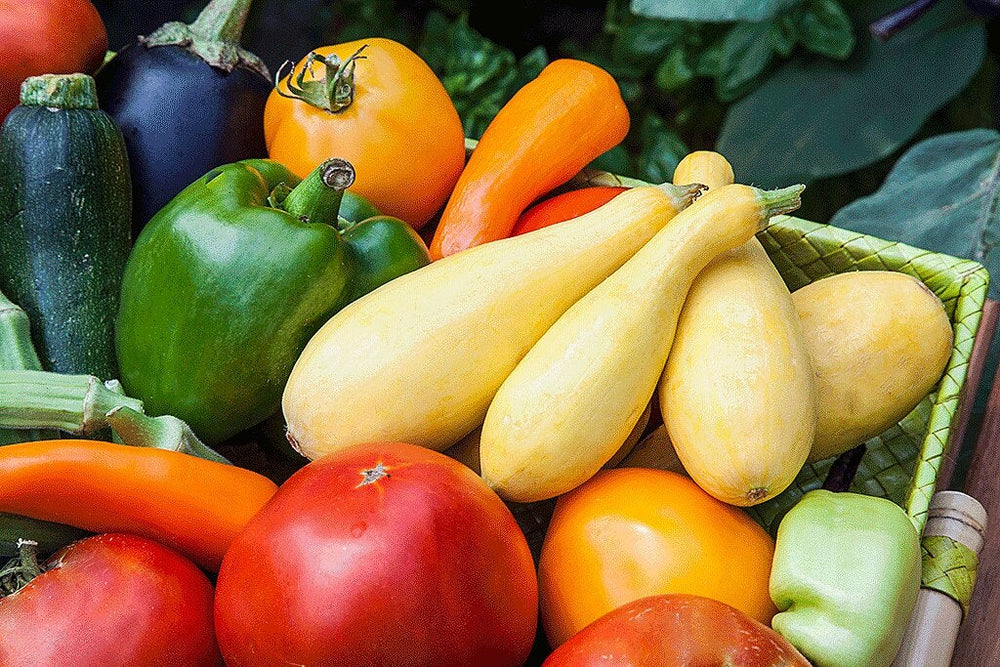Walk into any farmers market and you'll see a wide range of heirloom vegetables for sale, often for a heftier price than their hybrid cousins (especially when it comes to heirloom tomatoes). But are heirlooms really better than hybrids? Is it true that they're harder to grow? And what is an heirloom, anyway? Read on for answers to your most pressing questions about heirloom vegetables.
What is an heirloom vegetable?
The answer to this question depends on whom you ask. In general, heirloom vegetable varieties have been around for at least 50 years and are open-pollinated, meaning insects and wind handle the pollination. Heirloom vegetable plants are also stable, consistently yielding the same characteristics year to year, so seeds can be saved for future plantings.
Are heirloom vegetables harder to grow than hybrids?
Both types of plants require the same things to succeed—water, soil, and sunlight. Hybrids, though (especially tomatoes), "do represent some of the newest and best inroads in disease resistance and performance," says Kathleen Cue, horticulture program coordinator at Nebraska Extension. In addition to the lower threat of disease, some hybrids, like the bush types of vining crops, don't require staking, and so don't demand as much hands-on attention during the growing season. Still, when heirlooms are grown in regions similar to the ones in which they were developed, they usually perform well without a lot of pampering.
Do heirloom vegetables taste better than hybrids?
On the whole, heirloom veggies do offer good flavor. "Taste is subjective, but older varieties were typically bred for local consumption and fresh eating," says Shawn Wright, horticulture specialist at the University of Kentucky. Many of the new hybrid varieties being developed today, however, are bred for shipping quality, yield, and disease resistance, he says, so flavor isn't always the top priority.
Penn State Extension horticultural educator Steve Bogash has held large public tomato tastings since 2000. "The heirloom tomatoes win every time," he says. Of course, everyone has different tastes, and hybrids (such as Sun Gold) have risen to the top in other taste tests. Still, the association of flavor with heirlooms makes sense when you think about it from a gardener's point of view, as many heirlooms started as seeds saved by gardeners who wanted to preserve the best-tasting veggies.
Do heirloom vegetables produce less fruit?
It depends on the crop. With varieties like Clemson Spineless okra, Waltham butternut squash, and Lacinato kale, yields can be heavy enough that you may need to share the harvest. Many heirloom tomatoes, on the other hand, have small yields. "You might get five to seven fruits per plant from these huge plants," says Bogash. "But that's where the flavor comes from—all those leaves." Cue agrees. "Heirloom tomatoes tend to not be as prolific as hybrids, so what you gain in flavor is limited by yields."



Do heirloom vegetables have disease resistance?
Some do, some don't. "Hybrids in general have greater disease resistance because that is one of the factors breeders select for," says Wright. "Heirloom varieties have some disease resistance or they would not have survived to become heirlooms." As with hybrids, of course, some have more than others.
Are there any secrets to growing heirloom vegetables successfully?
Start with heirloom varieties suited for your region, then be sure to water and fertilize regularly so plants don't get stressed, which makes them more susceptible to attack by pests and diseases. "Sanitation is critical whether you're growing heirlooms or hybrids," Wright says. "If you have diseased plants, get them out of the garden. Don't just throw them in a pile in the middle of the row. Also, keep weeds down because they harbor insects and diseases."
With tomatoes, Bogash recommends a pro-active disease management program. That means weekly fungicide sprays of chlorothalonil or copper (for organic gardeners). "Chlorothalonil fungicides are relatively rainfast, but you'll have to spray new growth each week," he says. "With copper, you have to reapply after rain." He also recommends removing all branches below the lowest fruit cluster, to ensure leaves don't touch the ground.
Should I grow only heirloom vegetables?
Most experts agree that you should grow both heirlooms and hybrids. "Practically speaking, by growing a diversity of crops, you should have success with something," Wright says. Cue grows both types of tomatoes in her Iowa garden. She prefers heirlooms for fresh eating and counts on the hybrids' heavier harvests to supply her canning needs. Bogash's garden also features a mix of hybrids and heirlooms, including Mortgage Lifter and Brandy Boy, a hybrid that blends strong disease resistance with the classic heirloom flavor of Brandywine.
Is there an easy heirloom vegetable I can grow for my first garden?
Try growing Parris Island Cos romaine lettuce, either in pots or planting beds. Blue Lake Bush beans can be easy to grow, too, although they're a favorite among rabbits. Wright's vote, though, is for zucchini. "That's one of the easiest crops to grow—even kids get great results," he says. "The heirloom Black Beauty has been around forever. The secret is to stagger plantings every 7 to 10 days so you won't be overwhelmed with harvest—and you won't end up with those giant war club zucchinis."
What should I expect when I start growing heirloom vegetables?
For one thing, you'll make a lot of discoveries about gardening, along with having some fresh food for your table! "There are few guarantees in life, and agriculture fits that category," Wright says. "You'll always have successes and failures. Don't base your opinion on one year's results, because gardening is a marathon, not a sprint. Above all, enjoy the process."
Article written by Julie Martens Forney.

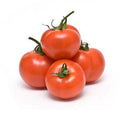

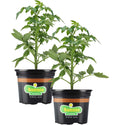
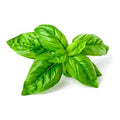 Herbs
Herbs
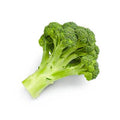 Vegetables
Vegetables
 Fruit
Fruit
 Flowers
Flowers
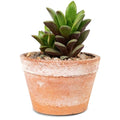 Succulents
Succulents
